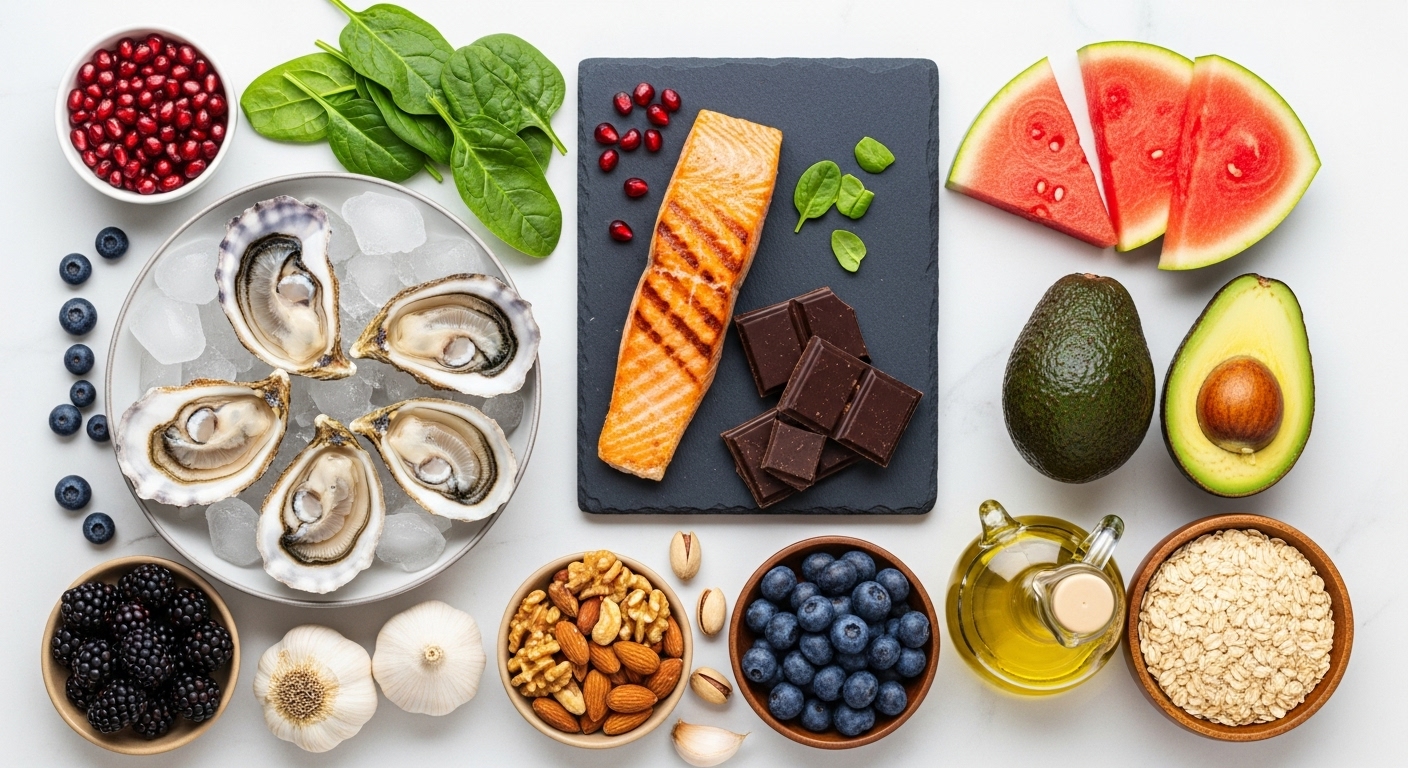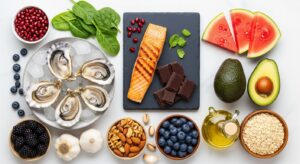12 Best Foods Men Should Eat After 30 for Sexual Health
Men face a harsh biological reality after turning 30: testosterone levels naturally decline by 1.6% every year, while metabolic changes, cardiovascular health challenges, and increased oxidative stress conspire against sexual performance. The good news? Scientific research shows that specific foods can significantly counteract these age-related changes, boosting testosterone, improving blood flow, and enhancing overall sexual function. Studies demonstrate that men following targeted nutritional strategies can see measurable improvements in erectile function, sexual desire, and hormonal balance within just 3-6 months.
The connection between nutrition and sexual health isn’t just folk wisdom—it’s backed by decades of peer-reviewed research. From the Massachusetts Male Aging Study tracking testosterone decline to Mediterranean diet trials showing dramatic improvements in erectile dysfunction, the evidence is clear: what you eat directly impacts how well you perform in the bedroom. Unlike quick fixes or expensive supplements, the foods we’ll explore work through natural biological pathways your body already understands, supporting nitric oxide production, optimizing hormone levels, and protecting against the oxidative damage that accelerates sexual decline.
Why sexual health changes after 30
Your body undergoes several critical changes after 30 that directly impact sexual performance and desire. The most significant is the steady decline in testosterone production—not just the dramatic drops associated with andropause, but a consistent yearly reduction that accumulates over time. The Baltimore Longitudinal Study of Aging and Massachusetts Male Aging Study both confirm that bioavailable testosterone declines linearly throughout adult life, with free testosterone dropping 2-3% annually due to increasing sex hormone-binding globulin (SHBG) levels.
Simultaneously, your cardiovascular system begins showing early signs of wear. Endothelial function—your blood vessels’ ability to dilate and increase blood flow—starts declining, directly affecting erectile quality. Research published in Nature Reviews Cardiology reveals that erectile dysfunction often precedes cardiovascular events by 2-5 years, sharing the same underlying pathophysiology of endothelial dysfunction, inflammation, and reduced nitric oxide availability.
Metabolic changes compound these issues. Insulin sensitivity decreases, making weight management more challenging, while a Chinese study found that 52% of young ED patients had insulin resistance that independently correlated with dysfunction severity. Meanwhile, oxidative stress increases throughout your thirties, with reactive oxygen species directly scavenging the nitric oxide essential for healthy erections.
The modern lifestyle accelerates these changes. Chronic stress elevates cortisol, which suppresses testosterone production. Poor sleep quality—increasingly common in busy thirties—disrupts the natural hormone cycles that restore testosterone overnight. Processed food consumption creates inflammatory responses that damage blood vessels, while sedentary work habits contribute to the metabolic dysfunction that impairs sexual health.
12 essential foods for male sexual health after 30
Oysters – The ultimate zinc powerhouse
Oysters aren’t just an aphrodisiac legend—they’re a nutritional powerhouse containing more zinc than any other food, with a single oyster providing up to 90 micrograms of this essential mineral. A systematic review published in the Journal of Trace Elements in Medicine and Biology analyzed 38 studies and found that zinc deficiency directly reduces testosterone levels, while supplementation improves both total and free testosterone.
Zinc serves multiple critical functions for sexual health. It’s an essential cofactor for steroidogenic enzymes that synthesize testosterone in your Leydig cells. It reduces sex hormone-binding globulin, increasing the amount of free, biologically active testosterone circulating in your bloodstream. For sperm health, zinc protects against oxidative damage while supporting normal spermatogenesis and motility.
Wayne State University research demonstrated that men getting 30mg of zinc daily showed increased free testosterone levels, while zinc deficiency for just 20 weeks caused testosterone to plummet in healthy young men. The recommended daily intake for men over 30 is 11-14mg, but therapeutic doses of 15-30mg daily can help restore optimal levels in deficient men.
Beyond oysters, excellent zinc sources include red meat, liver, shellfish, pumpkin seeds, and dark chocolate. Six medium oysters provide your entire weekly zinc requirement, but if raw oysters aren’t your style, 3 ounces of lean beef or a handful of pumpkin seeds offer substantial amounts.
Spinach – Magnesium for hormone optimization
This leafy green delivers a potent combination of magnesium, folate, and nitrates that work synergistically to support sexual health. Magnesium is particularly crucial for men over 30, serving as a cofactor for over 300 enzymatic reactions, including those involved in testosterone synthesis and bioavailability.
Research from Biological Trace Element Research found that men taking 10mg of magnesium per kilogram of body weight daily for four weeks showed significant increases in both free and total testosterone, with greater improvements in those who exercised regularly. The mechanism involves magnesium reducing SHBG levels while supporting the enzymatic processes that convert cholesterol into testosterone.
Spinach also contains high levels of nitrates—approximately 245mg per 100g—which your body converts to nitric oxide through a process enhanced by oral bacteria and stomach acid. A fascinating 2024 case report documented a 56-year-old man with moderate ED who increased his leafy green intake from 3 to 6 daily servings. His ED normalized within months, and his International Index of Erectile Function score improved from 9 to 20.
The folate in spinach supports healthy homocysteine metabolism, reducing this inflammatory amino acid that can damage blood vessels and impair erectile function. One cup of cooked spinach provides 65% of your daily folate needs and 39% of your magnesium requirement.
Other magnesium-rich options include Swiss chard, pumpkin seeds, almonds, and dark chocolate. Aim for 400-420mg of magnesium daily through food sources, as this mineral works best when consumed with meals and alongside other nutrients.
Salmon – Omega-3s for vascular health
Wild-caught salmon provides a concentrated dose of EPA and DHA omega-3 fatty acids that are absolutely crucial for maintaining healthy blood flow to all organs—including those needed for sexual performance. These anti-inflammatory fats work through multiple pathways to support sexual health as you age.
Animal research published in the Journal of Korean Medical Science showed that omega-3 treatment significantly improved penile blood flow and reduced fibrotic damage in rats with atherosclerosis-induced erectile dysfunction. Human studies reinforce these findings: a 2020 JAMA Network study of 1,694 young men found that fish oil users had larger testes, higher semen volume and quality, and healthier hormone profiles.
The mechanism involves omega-3s improving endothelial function and nitric oxide production while reducing the chronic inflammation that damages blood vessel walls. They prevent atherosclerotic plaque formation in the small penile arteries, maintain healthy triglyceride levels, and enhance sperm membrane integrity.
A 3.5-ounce serving of wild salmon provides approximately 1,800mg of combined EPA and DHA. For optimal sexual health benefits, research suggests consuming 2,000-3,000mg daily, which translates to 2-3 servings of fatty fish weekly. Other excellent sources include mackerel, sardines, anchovies, and sustainably sourced fish oil supplements.
The timing matters too. Omega-3s require at least 3-6 months of consistent intake to meaningfully improve vascular function, as they need time to be incorporated into cell membranes throughout your cardiovascular system.
Avocados – Healthy fats for hormone production
Avocados provide the healthy monounsaturated fats your body needs to manufacture testosterone while delivering vitamin E, potassium, and folate that support overall sexual health. Your body synthesizes testosterone from cholesterol, making adequate healthy fat intake essential—particularly as men over 30 often reduce fat intake in well-meaning but counterproductive weight management efforts.
Research consistently shows that men consuming higher amounts of monounsaturated fats have higher testosterone levels compared to those on low-fat diets. The vitamin E in avocados acts as a powerful antioxidant, protecting testosterone molecules from oxidative damage while supporting healthy sperm production and motility.
A medium avocado contains approximately 20 grams of monounsaturated fat, 10 grams of fiber, and substantial amounts of potassium—a mineral that supports healthy blood pressure and circulation. The combination of healthy fats, fiber, and potassium makes avocados particularly valuable for men dealing with metabolic changes after 30.
The folate content (20% of daily value per avocado) supports healthy homocysteine metabolism, reducing inflammation that can impair erectile function. Studies show that men with higher folate intake have better sperm quality and lower rates of chromosomal abnormalities.
Add half an avocado to your daily diet through smoothies, salads, or simply eaten with a drizzle of olive oil and sea salt. The fats will also help you absorb fat-soluble vitamins from other foods in the same meal.
Dark chocolate – Flavonoids for circulation
High-quality dark chocolate (70% cocoa or higher) contains flavonoids that have been scientifically proven to improve erectile function and sexual satisfaction. The largest study on this connection followed 25,096 men for 10 years as part of the Health Professionals Follow-Up Study, finding that men in the highest quintile of flavonoid intake had 9-11% reduced erectile dysfunction incidence.
The active compounds—specifically flavones, flavanones, and anthocyanins—work by stimulating nitric oxide synthase while reducing NADPH oxidase activity, the enzyme complex that produces damaging reactive oxygen species. Research shows that consuming 30 grams of dark chocolate daily increases nitric oxide levels and decreases blood pressure within hours.
Beyond vascular benefits, dark chocolate contains phenylethylamine and anandamide, compounds that can improve mood and reduce stress—psychological factors that significantly impact sexual performance. The magnesium content (58mg per ounce) supports testosterone production and muscle function.
Choose chocolate with at least 70% cocoa content to maximize flavonoid levels while minimizing sugar. One to two ounces several times per week provides therapeutic benefits without excessive calories. Look for brands that specify cocoa percentage and avoid those with added sugars, artificial ingredients, or excessive processing that destroys beneficial compounds.
Pair dark chocolate with other flavonoid-rich foods like berries or nuts to create a synergistic antioxidant effect that provides even greater protection against the oxidative stress that impairs sexual function.
Pomegranate – Antioxidants for performance
Pomegranates and their juice have been subjected to rigorous clinical testing for erectile dysfunction, with impressive results. A randomized, placebo-controlled study published in the International Journal of Impotence Research found that 47% of men with mild to moderate ED reported improvements with 8 ounces of pomegranate juice daily, compared to 32% with placebo.
The secret lies in pomegranate’s exceptionally high concentration of polyphenols and antioxidants that protect nitric oxide from oxidative destruction while enhancing its biological actions. These compounds prevent the breakdown of nitric oxide that naturally occurs from aging and oxidative stress, allowing for better blood vessel dilation and erectile function.
Pomegranates also support cardiovascular health more broadly. A 3-year study showed that consuming pomegranate juice reduced carotid artery thickness and blood pressure, indicating improved overall vascular health that benefits sexual function. The fruit’s anti-inflammatory properties help maintain healthy endothelial function throughout the circulatory system.
Eight ounces of pure pomegranate juice provides the therapeutic dose used in clinical trials. However, this amount contains significant natural sugars (30+ grams), so men with diabetes or insulin resistance should consider pomegranate extract supplements or smaller amounts of juice diluted with water.
Fresh pomegranate seeds offer fiber along with the beneficial compounds, providing about 1/3 the polyphenol content of juice but with better blood sugar control. Add pomegranate seeds to yogurt, salads, or eat them as a snack.
Watermelon – Natural L-citrulline boost
Watermelon contains L-citrulline, an amino acid that your body converts to L-arginine, which then produces nitric oxide for improved blood flow. This makes watermelon a natural “Viagra” with scientific backing. Research shows that men with mild erectile dysfunction have significantly lower citrulline levels than healthy controls, and supplementation can improve erection maintenance.
A cup of diced watermelon contains approximately 365mg of L-citrulline. Clinical studies show that 1.5 grams daily for one month improved erection maintenance in men with ED, making 1.5 cups of watermelon a reasonable daily target. A 2019 study found that specific varieties like Crimson Sweet and Dixielee contain even higher citrulline concentrations.
Recent research published in Current Developments in Nutrition showed an interesting finding: 330 grams of fresh watermelon daily for 4 weeks showed a trend toward increased testosterone in men, though the result didn’t quite reach statistical significance (P=0.094). This suggests watermelon may provide benefits beyond just nitric oxide production.
Concentrated watermelon juice provides higher citrulline levels than whole fruit, but the fiber in whole watermelon helps moderate blood sugar response. The fruit also provides lycopene, vitamin C, and potassium that support overall cardiovascular health.
For maximum benefit, choose fully ripe watermelons and consume them fresh. The citrulline content is highest in the white rind, so don’t discard it entirely—blend it into smoothies or juice it for additional benefits.
Mixed nuts – Arginine and healthy fats
Nuts provide a perfect combination of L-arginine, healthy fats, protein, and minerals that work together to support sexual health. The most impressive research comes from a Spanish clinical trial where men consuming 60 grams of mixed nuts daily (walnuts, almonds, hazelnuts) for 14 weeks showed significant increases in orgasmic function and sexual desire.
A separate study focused specifically on pistachios found even more dramatic results. Men with established erectile dysfunction consuming 100 grams of pistachios daily for just 3 weeks saw their International Index of Erectile Function scores improve from 36 to 54.2—a clinically significant improvement. They also showed improved penile blood flow velocity and better cholesterol profiles.
The mechanisms are multifaceted. Nuts are rich in L-arginine, a precursor to nitric oxide that’s essential for healthy erections. The healthy fats support testosterone production, while antioxidants like vitamin E protect against oxidative damage. Minerals including magnesium, zinc, and selenium support various aspects of sexual and reproductive health.
However, portion control matters. One hundred grams of pistachios contains approximately 560 calories, making it important to account for this in your overall calorie intake or increase physical activity accordingly. A more sustainable approach might be 30-40 grams (about 1/4 cup) of mixed nuts daily.
Choose raw or lightly roasted nuts without added oils or excessive salt. Store them properly to prevent rancidity, which destroys beneficial compounds and creates harmful oxidation products.
Berries – Anthocyanins for blood vessel health
Berries contain some of the highest concentrations of anthocyanins and other flavonoids that specifically benefit erectile function. The Health Professionals Follow-Up Study found that high anthocyanin intake was associated with a 9% reduced risk of erectile dysfunction, with the strongest benefits from blueberries, blackberries, cherries, and strawberries.
These compounds work as potent antioxidants that protect the delicate endothelial cells lining your blood vessels from oxidative damage. They also enhance nitric oxide bioavailability and reduce the inflammatory processes that impair vascular function. The vitamin C in berries further supports nitric oxide synthase, the enzyme that produces nitric oxide from L-arginine.
Blueberries deserve special mention for their exceptionally high anthocyanin content and supporting research. Studies show that blueberry consumption improves memory and cognitive function—benefits that extend to sexual performance since the brain is your most important sexual organ.
Aim for one cup of mixed berries daily, varying the types to get the broadest spectrum of beneficial compounds. Frozen berries retain most of their nutritional value and are often more cost-effective than fresh. Add them to yogurt, smoothies, oatmeal, or eat them as snacks.
The natural sugars in berries are balanced by fiber and beneficial compounds, making them a better choice than processed sweets for men managing weight or blood sugar levels after 30.
Olive oil – Mediterranean magic
Extra virgin olive oil is a cornerstone of the Mediterranean diet, which has the strongest research evidence for supporting male sexual health. A Greek study of 250 men with hypertension and erectile dysfunction found that those with high Mediterranean diet adherence (scores over 29) had higher testosterone levels, better coronary flow reserve, and improved erectile performance.
The magic lies in olive oil’s unique combination of monounsaturated fats and polyphenolic compounds. These substances increase plasma antioxidant capacity while affecting nitric oxide bioavailability. The PREDIMED study showed that Mediterranean diet supplemented with extra-virgin olive oil increased plasma antioxidant enzymes like superoxide dismutase and catalase.
Olive oil’s anti-inflammatory properties help maintain healthy endothelial function, the foundation of good circulation. The monounsaturated fats support hormone production while providing a more stable fat for cooking compared to polyunsaturated oils that easily oxidize at high temperatures.
Use 2-3 tablespoons of extra virgin olive oil daily through cooking, salad dressings, or drizzling over vegetables. Choose cold-pressed, extra virgin varieties in dark glass bottles to preserve beneficial compounds. Store in a cool, dark place and use within 12 months of opening.
The Mediterranean diet research suggests consuming about 9 tablespoons per week as part of an overall healthy dietary pattern that includes vegetables, fruits, nuts, and fish.
Garlic – Circulation and testosterone support
Garlic contains allicin and other sulfur compounds that support both cardiovascular health and hormone production. While direct erectile dysfunction research is limited, garlic’s well-documented cardiovascular benefits translate to improved sexual health through better circulation and reduced arterial stiffness.
Animal studies suggest that garlic may support testosterone production by reducing cortisol levels and protecting Leydig cells in the testes from oxidative damage. The anti-inflammatory properties help maintain healthy endothelial function throughout the circulatory system.
Garlic also supports nitric oxide production through multiple pathways. It contains compounds that can directly stimulate nitric oxide synthase while providing antioxidant protection that prevents nitric oxide breakdown. The cardiovascular benefits include reduced blood pressure, improved arterial flexibility, and better overall circulation.
To maximize benefits, crush or chop fresh garlic and let it sit for 10 minutes before cooking. This allows the enzyme alliinase to convert alliin to allicin, the most active compound. One to two cloves daily provide therapeutic levels while adding flavor to your meals.
Aged garlic extract supplements provide standardized amounts of active compounds without the social drawbacks of fresh garlic consumption, but fresh garlic offers the broadest spectrum of beneficial compounds.
Oats – Sustained energy and arginine
Steel-cut oats provide sustained energy release that supports stable blood sugar levels throughout the day, preventing the energy crashes that can negatively impact sexual desire. They also contain L-arginine, though in smaller amounts than nuts, contributing to your daily intake of this nitric oxide precursor.
The soluble fiber in oats helps manage cholesterol levels, supporting cardiovascular health that’s essential for erectile function. Beta-glucan, the specific fiber in oats, has been shown to reduce LDL cholesterol while supporting healthy blood glucose management—both important for men over 30 dealing with metabolic changes.
Oats also provide B vitamins that support energy metabolism and nervous system function, both crucial for sexual health. The complex carbohydrates provide steady energy for both physical performance and hormone production, which requires adequate caloric intake.
Choose steel-cut or rolled oats over instant varieties, which have been processed in ways that reduce their nutritional value and increase their glycemic impact. Top your oats with berries, nuts, and a drizzle of honey for a sexual health powerhouse breakfast.
One cup of cooked oats provides about 300mg of L-arginine along with 4 grams of fiber and 6 grams of protein, making it a balanced foundation for sustained energy and sexual health support.
Foods to limit for optimal sexual health
Certain foods actively work against sexual health by promoting inflammation, impairing circulation, or disrupting hormone production. Processed foods high in trans fats and refined sugars create inflammatory responses that damage blood vessels and reduce nitric oxide availability. Studies show that men consuming high amounts of processed foods have significantly higher rates of erectile dysfunction.
Excessive alcohol consumption beyond moderate levels (1-2 drinks daily) suppresses testosterone production and impairs nervous system function essential for sexual response. While small amounts of red wine may provide cardiovascular benefits through resveratrol and other compounds, chronic heavy drinking is one of the fastest ways to impair sexual function.
High-sugar foods and beverages cause rapid blood sugar spikes followed by crashes that can affect energy, mood, and sexual desire. More importantly, chronic high sugar intake promotes insulin resistance, which independent research shows correlates strongly with erectile dysfunction severity even in young men.
Fried foods and those high in saturated fats from processed sources can impair circulation and contribute to arterial dysfunction. While some saturated fat is necessary for hormone production, excessive amounts from processed sources create oxidative stress and inflammation.
Creating your sexual health meal plan
Building a sustainable eating pattern around these foods doesn’t require dramatic changes—it’s about strategic additions and smart substitutions. Start your day with steel-cut oats topped with berries and nuts, providing sustained energy along with anthocyanins, healthy fats, and arginine. This combination supports stable blood sugar and provides building blocks for nitric oxide production.
For lunch, build salads around dark leafy greens like spinach, adding avocado for healthy fats and pomegranate seeds for antioxidants. Include a palm-sized portion of salmon or other fatty fish 2-3 times weekly, or choose lean meats that provide zinc and protein on other days.
Dinner preparation should include plenty of vegetables drizzled with extra virgin olive oil, lean proteins, and moderate amounts of whole grains. Incorporate garlic into your cooking regularly, and finish meals with a small piece of dark chocolate several times weekly.
Strategic snacking on mixed nuts (1/4 cup daily) provides sustained energy while delivering therapeutic amounts of arginine and healthy fats. Keep portion sizes reasonable to avoid excessive calories that could contribute to weight gain and metabolic dysfunction.
The Mediterranean dietary pattern provides an excellent framework, emphasizing vegetables, fruits, whole grains, nuts, fish, and olive oil while limiting processed foods. Research shows this pattern is specifically associated with better sexual health outcomes in men over 30.
When to expect results and what to monitor
Nutritional interventions work on different timelines depending on the mechanism involved. Acute improvements in blood flow from nitric oxide-boosting foods like watermelon or pomegranate juice can occur within 2-3 hours, though these effects are temporary without consistent intake.
Short-term benefits typically emerge within 2-4 weeks of consistent dietary changes. You might notice improved energy levels, better sleep quality, and enhanced mood—all factors that contribute to sexual desire and performance. Some men report increased morning erections, often the first sign of improved nocturnal testosterone production and vascular health.
Significant improvements in erectile function, sexual satisfaction, and hormone levels typically require 6-14 weeks of consistent dietary changes, based on clinical trials. The FERTINUTS study showing improved orgasmic function took 14 weeks, while the pistachio study showed results in just 3 weeks—likely due to the higher therapeutic doses used.
Long-term vascular and hormonal benefits develop over 3-6 months as new dietary patterns reduce inflammation, improve insulin sensitivity, and support optimal hormone production. This timeline aligns with the natural cycles of sperm production (74 days) and the time needed for significant improvements in endothelial function.
Monitor changes in energy levels, sleep quality, exercise performance, and overall sense of vitality alongside sexual function improvements. These indicate that the nutritional interventions are working systemically to support your health.
The evidence is clear: what you eat after 30 directly impacts your sexual health and performance. The foods outlined here work through proven biological pathways—supporting nitric oxide production, optimizing testosterone levels, reducing inflammation, and protecting against age-related decline. Unlike quick fixes or expensive supplements, these evidence-based nutritional strategies provide lasting benefits that extend far beyond the bedroom.
Starting with just 2-3 of these foods daily and gradually building a complete nutritional approach can yield measurable improvements within weeks. The key is consistency and understanding that sexual health is inseparable from overall health. By nourishing your body with these scientifically-proven foods, you’re not just supporting better sexual performance—you’re investing in cardiovascular health, hormone optimization, and vitality that will serve you for decades to come.
Remember that while nutrition provides a powerful foundation, sexual health is multifaceted. Regular exercise, stress management, adequate sleep, and maintaining a healthy weight all work synergistically with proper nutrition. If you’re experiencing persistent sexual health issues, consult with a healthcare provider who can evaluate whether underlying medical conditions need attention alongside your improved dietary approach.
Optimizing meal timing for sexual health
The timing of when you eat matters just as much as what you eat for maintaining optimal sexual health and hormone production. Research reveals fascinating insights about how your body’s natural rhythms interact with food intake to influence testosterone levels, energy for sexual activity, and overall reproductive health.
Morning testosterone patterns and breakfast timing deserve special attention because testosterone levels naturally peak in the early morning hours, typically between 6-8 AM. A Swedish study published in Andrologia found that testosterone levels decreased by 30% within 60-120 minutes after eating a standard 550-calorie meal, even though luteinizing hormone and sex hormone-binding globulin remained unchanged. This temporary post-meal dip occurs because elevated glucose and insulin levels can temporarily suppress the hypothalamic-pituitary-testicular axis.
For men over 30, this research suggests strategic timing around testosterone testing and sexual activity. If you’re getting hormone levels checked, morning fasting samples provide the most accurate baseline readings. For sexual health, planning intimate moments in the morning before eating can coincide with your highest natural testosterone levels, potentially enhancing libido and performance.
Pre-workout nutrition timing plays a crucial role in supporting both exercise performance and testosterone production. Consuming a balanced meal containing protein and complex carbohydrates 1-2 hours before resistance training provides sustained energy while avoiding the temporary testosterone suppression that occurs immediately after eating. A study from Cronometer found that men who followed this timing strategy showed better workout performance and maintained healthier testosterone patterns compared to those who ate immediately before exercising.
Post-exercise recovery nutrition offers a powerful window for optimizing sexual health benefits. Research shows that consuming protein and carbohydrates within 30-60 minutes after resistance training maximizes muscle recovery, glycogen replenishment, and testosterone production. The ideal post-workout meal might include grilled chicken with quinoa and vegetables, a protein smoothie with banana and almond butter, or an egg scramble with avocado and whole grain toast.
Evening meal timing significantly impacts sleep quality and overnight hormone production. Eating large meals within 3 hours of bedtime can disrupt sleep architecture and interfere with the natural testosterone restoration that occurs during deep sleep phases. Men over 30 already experience declining testosterone production overnight, making quality sleep even more critical for maintaining sexual health.
Instead of heavy evening meals, focus on lighter dinners rich in the sexual health foods discussed earlier—perhaps salmon with spinach salad, or a small portion of nuts and berries. This approach supports better sleep while providing the nutrients needed for overnight hormone production and recovery.
The intermittent fasting question: Complex effects on male hormones
Intermittent fasting has surged in popularity, but its effects on male sexual health and testosterone present a complex picture that men over 30 need to understand carefully. The research reveals both potential benefits and important considerations that could significantly impact your hormone levels and sexual function.
The testosterone paradox in fasting research shows conflicting results that depend heavily on individual factors. A comprehensive 2022 review published in Nutrients analyzed human trials and found that time-restricted eating (consuming all food within an 8-hour window) decreased testosterone levels in young, lean, active men by approximately 10-15%. However, these men maintained muscle mass and strength despite lower hormone levels, suggesting the body may adapt to fasting in complex ways.
For men with metabolic dysfunction or excess weight, the equation changes dramatically. A clinical investigation by Dr. Mark Holthouse found that men implementing intermittent fasting as part of comprehensive lifestyle changes saw testosterone increases of 30-50% on average. The key difference appears to be baseline metabolic health—men with insulin resistance, inflammation, or excess abdominal fat may benefit from fasting’s metabolic improvements, while lean men might experience temporary hormone suppression.
Mechanistic insights help explain these contradictory findings. Short-term fasting (up to 24 hours) can temporarily increase luteinizing hormone (LH), which signals the testes to produce testosterone. However, extended fasting or chronic calorie restriction activates stress responses that can suppress reproductive hormones. A study from the 1980s showed that even moderate calorie restriction in healthy men reduced testosterone by the 9th day of intervention.
The insulin-testosterone connection provides crucial context for men over 30. Intermittent fasting primarily benefits sexual health by improving insulin sensitivity and reducing chronic inflammation—two major factors that suppress testosterone production in metabolically unhealthy men. When insulin levels remain constantly elevated from frequent eating, testosterone synthesis becomes impaired through multiple pathways.
Practical recommendations for men considering intermittent fasting depend on your current health status. If you’re carrying excess weight, have metabolic syndrome, or struggle with insulin resistance, a moderate 16:8 fasting protocol (eating within an 8-hour window) may provide substantial benefits for sexual health. Start gradually, ensure adequate protein and nutrient intake during eating windows, and monitor energy levels and libido.
For lean, healthy men with normal testosterone levels, the risk-benefit calculation differs. Consider shorter fasting windows (12-14 hours), avoid combining fasting with intense training, and prioritize the sexual health foods outlined earlier during your eating periods.
Red flags to watch for include persistent fatigue, decreased morning erections, reduced libido, or declining exercise performance. If you experience these symptoms while fasting, consider adjusting your approach or consulting with a healthcare provider familiar with both fasting and hormone optimization.
Supplement timing and food synergies
Strategic supplement timing can enhance the sexual health benefits of the foods you’re already eating, but timing and combinations matter tremendously for optimal absorption and effectiveness. Understanding these synergies allows you to maximize your investment in both food and targeted nutrients.
Zinc absorption optimization requires careful attention to timing and food combinations. The zinc from oysters and pumpkin seeds absorbs best on an empty stomach, but this can cause nausea in some men. Research shows that taking zinc with a small amount of protein—like a handful of nuts—reduces gastric irritation while maintaining good absorption. Avoid taking zinc supplements with calcium-rich foods, coffee, or high-fiber meals, as these can reduce absorption by up to 50%.
Magnesium from spinach and dark chocolate works synergistically with vitamin D to support testosterone production. A study published in Biological Trace Element Research found that men taking magnesium supplements showed greater testosterone increases when their vitamin D levels were optimized above 30 ng/mL. The magnesium in whole foods comes with cofactors that enhance utilization, making food sources superior to isolated supplements.
Omega-3 timing strategies can significantly impact their anti-inflammatory and vascular benefits. The EPA and DHA in salmon and sardines absorb better with fat-containing meals, but timing matters for sexual health applications. Taking fish oil with dinner provides anti-inflammatory benefits overnight, while morning dosing may better support exercise-related circulation improvements.
Vitamin D and sexual health deserves special attention because deficiency affects up to 80% of men in northern climates. Vitamin D supports testosterone production and is crucial for the absorption of several nutrients important for sexual health. The fat-soluble vitamin absorbs best with the healthy fats found in avocados, nuts, and olive oil.
L-arginine and citrulline timing from watermelon and nuts can be strategically used for acute sexual health benefits. L-citrulline converts to arginine more effectively than direct arginine supplementation, and timing intake 30-60 minutes before sexual activity may provide vascular benefits. However, consistent daily intake through food sources provides better long-term endothelial health than sporadic supplementation.
Antioxidant synergies from berries, dark chocolate, and pomegranate work best when consumed together or in close timing. The various flavonoids and polyphenols have complementary mechanisms for protecting nitric oxide and supporting circulation. A mixed berry smoothie with dark chocolate provides broader antioxidant coverage than consuming these foods separately.
Lifestyle integration strategies
Successful dietary changes for sexual health require integration with your existing lifestyle rather than dramatic overhauls that are difficult to sustain. Research consistently shows that gradual, systematic changes produce better long-term outcomes than extreme dietary shifts.
The 80/20 principle works particularly well for sexual health nutrition. Focus on incorporating the beneficial foods discussed 80% of the time, while allowing flexibility for social situations and food enjoyment the remaining 20%. This approach reduces stress around food choices while ensuring consistent nutrient intake for hormone optimization and circulation support.
Weekly meal planning around sexual health foods creates sustainable routines without overwhelming complexity. Designate two days per week for salmon or fatty fish, include leafy greens in lunch salads most days, and establish a regular pattern of mixed nuts as afternoon snacks. This systematic approach ensures consistent intake of key nutrients while allowing for variety and personal preferences.
Kitchen preparation strategies can make healthy choices more convenient than processed alternatives. Wash and prep spinach, berries, and other produce when you bring them home. Keep mixed nuts in single-serving containers for easy portion control. Prepare larger batches of steel-cut oats that can be reheated throughout the week.
Social dining strategies help maintain sexual health nutrition goals while enjoying meals with others. When dining out, choose restaurants that offer grilled fish, salads with nuts and berries, or Mediterranean-style dishes rich in olive oil and vegetables. Most restaurants can accommodate requests for simple preparations that preserve the nutritional benefits of these foods.
Travel and convenience planning prevents disruptions to your sexual health nutrition routine. Pack mixed nuts, dark chocolate, and pomegranate seeds for healthy snacking during travel. Research restaurant options in advance when traveling for business. Many hotel breakfast buffets offer options like berries, nuts, and eggs that align with your sexual health goals.
Stress and emotional eating management requires recognition that sexual health is interconnected with psychological well-being. Chronic stress elevates cortisol, which directly suppresses testosterone production and increases cravings for processed foods. Incorporating stress-management techniques alongside nutritional changes enhances the effectiveness of dietary interventions for sexual health.
Building your personal action plan
Creating a sustainable, personalized approach to sexual health nutrition requires honest assessment of your current situation, realistic goal-setting, and systematic implementation of the evidence-based strategies outlined throughout this guide.
Week 1-2: Assessment and foundation building should focus on establishing baseline measurements and incorporating 2-3 of the easiest changes. Track your current energy levels, sleep quality, and sexual satisfaction using a simple 1-10 scale. Begin adding mixed nuts as afternoon snacks and including spinach in at least one daily meal. These changes provide immediate nutritional benefits while establishing new habits.
Week 3-4: Expansion and optimization allows you to add fatty fish twice weekly and incorporate berries into your breakfast routine. Start paying attention to meal timing, particularly avoiding large meals within 3 hours of bedtime. Notice changes in energy patterns and morning vitality as these nutritional improvements begin affecting your physiology.
Week 5-8: Integration and refinement involves adding the remaining sexual health foods and optimizing timing strategies. Include avocado regularly, use extra virgin olive oil as your primary cooking fat, and establish a routine around dark chocolate consumption. This timeframe typically coincides with when men begin noticing improvements in sexual desire and function.
Week 9-12: Evaluation and adjustment provides time for meaningful assessment of results. Most research shows that significant improvements in erectile function, testosterone levels, and sexual satisfaction require 6-14 weeks of consistent dietary changes. Use this period to fine-tune your approach based on what’s working best for your lifestyle and goals.
Long-term sustainability planning focuses on maintaining beneficial changes while allowing for life’s inevitable variations. Identify which foods and timing strategies provide the most noticeable benefits for your individual situation. Develop backup plans for challenging periods like travel, stress, or seasonal availability of certain foods.
Monitoring and troubleshooting should include both objective and subjective measures. Consider baseline and follow-up testosterone testing if you suspect hormonal issues, but also pay attention to daily markers like energy levels, exercise performance, sleep quality, and sexual satisfaction. These daily indicators often change before laboratory values and provide valuable feedback about the effectiveness of your nutritional approach.
Professional guidance integration becomes valuable when you’re dealing with persistent sexual health challenges despite nutritional improvements, underlying health conditions, or complex medication interactions. A healthcare provider familiar with both nutrition and sexual health can help optimize your approach and identify whether additional interventions might be beneficial.
Remember that while nutrition provides a powerful foundation, sexual health is multifaceted. Regular exercise, stress management, adequate sleep, and maintaining a healthy weight all work synergistically with proper nutrition. If you’re experiencing persistent sexual health issues, consult with a healthcare provider who can evaluate whether underlying medical conditions need attention alongside your improved dietary approach.














Post Comment